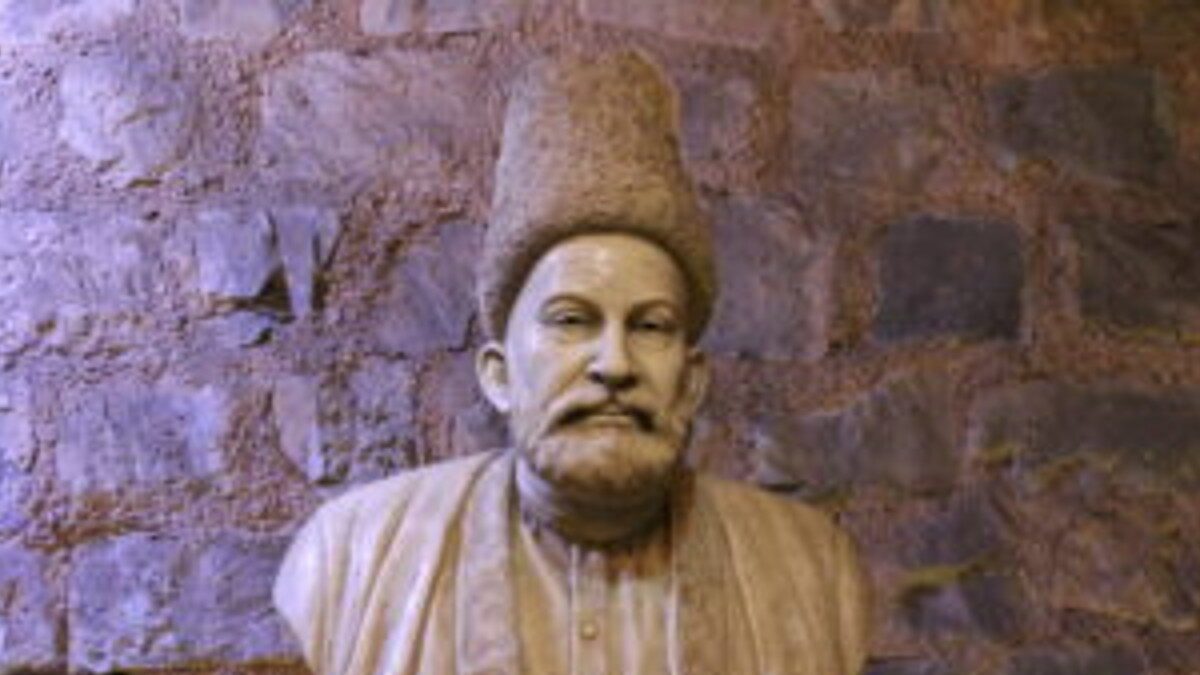From movies, drama series to stage plays, the bard of Urdu Literature, Mirza Asadullah Khan Ghalib has been a centric character. Apart from the movies, plays such as Ghalib and Ghalib in New Delhi, along with the others of similar genres have earned a lot of fame while working on the different aspects of his life. A play., quite similar to the genre but different in its plot, was staged on 19 August at the Shri Ram Centre for the 11th time.
‘Anti-National Ghalib’?
Written by the author-writer-teacher Danish Iqbal, Anti-National Ghalib is a play of its own kind. Continuously being staged for 10 times since the year 2017, the play was brought back to the stage after a long gap of two years by the organisation named Aatrangi Pitaara Foundation.
Staged, right after the celebrations of the 75th anniversary of the Indian Independence, the play is a quick reminder of pre-colonial, colonial and the post-colonial India. Well equipped with comedy, humour, literature, satire and politics, it would be apt to say that the play ‘Anti-National Ghalib’ is infact a mirror image of the society, for the audience to realise and laugh at the same time.
In the Director’s Eye
Summarising the play and the experiences from the Director’s perspective Manisha Sinha, one of the co-founders of Aatrangi Pitaara Foundation and the Director of ‘Anti-National Ghalib’, quoted one of his couplets;
‘hazaron khwahishein aesi ke har khwahish pe dam nikle
bohot nikle mere armaan lekin phir bhi kam nikle’
(A thousand desires (within me), such that each one seems worth dying for
Many desires have been fulfilled, yet I yearn for many more)
In a conversation with Patriot, Manisha stated that the play is all about struggles. “From those of Ghalib’s life and his times to those of our times, life is full of struggles. And as we say, the stage is a live imagery of the society and that’s how I’ll conclude the play”, told Manisha. Speaking about the plot and scenes of the play, she praised the writer Danish Iqbal and added that ‘Anti-National Ghalib’ is one of the finest depictions of our society.
“I have been an active part of the Delhi theatre community for the past six years and have been working with this play from the very beginning in 2017, when it was performed by the Tripod and Amit Bajaj was its Director. It has been an interesting journey and in a short period of five years including the approximate couple of years of the pandemic and lockdown, we successfully staged it for decuple times”, stated Manisha.
But what is it all about?
The plot, if defined, is a bridge between cinema, history, literature, judicial proceedings and the politics of our times. With a slight satire in all of these aspects, ‘Anti-National Ghalib’ is a theatre of absurdity.
Because of a rivalry between two filmmakers of our times, Ghalib’s ghazals and to be particular, his two couplets are termed offensive and hence the ‘anti-national’ poet is called to the court. Interestingly, the person has been dead from the past 150 years and hence the graves are reopened of the past sins as well.
His past cases are reopened and the bard is attacked with the accusations of being a drunkard, having extra-marital affairs and for not clearing his debt, while Mirza tries to defend himself and his couplets.
In the writer’s own words, “It is seriously a comedy”.
When the court of justice becomes a symposium!
How is it possible that there exists a poet and no poems? Especially when there’s Ghalib and the legend Sheikh Ibrahim Zauq as well. Zauq is brought to the court to strengthen the case against Mirza, but the proceedings turn into a mushaera. The rivalry between the filmmakers fades away as the historic poetic rivals of all times arrive.
As Shobhana Bharadwaj, a full time actor who has been involved with the stage from the age of 14 years, who is doing judge’s role stated that the play deals with a lot of minute details and aspects which remains ignored in a larger landscape. “While it turns into a symposium, issues regarding the alienation of Urdu aren’t side-lined. When Ghalib states, ‘Koyi misra to uthao!’ (to repeat the first line of the couplet), a court official with Mishra as his surname is asked to leave the courtroom”, she stated. “It is laughable and saddening at the same moment”, concluded Shobhna.
Theatre, An ‘Anti-National Ghalib’ and our times.
In the words of the director Manisha Sinha, “Theatre is dying a slow death. There are people who are passionate about it and thus the play goes on”. She told Patriot that the stage is a mirror where the society watches and laughs at itself. “Anti-National Ghalib fits perfectly in this case. We are going through a tough time, and all of us are struggling survivors, and so was Mirza Ghalib. He survived the aftermath of the revolt of 1857 and struggled through-out his life, and so are the actors, struggling to survive”, she added.
“It is saddening to see that goes on in our surroundings, a lot of things shouldn’t have been the way they are, but there remains a scope for our nation to regain the title of the golden bird”, added Shobhna.
Keshav Raina, who is the producer of this play and an actor as well stated that it’s a passion that keeps the game on. “I am a film director and now in the producing business while being on the stage as well, it’s a lot of pressure and responsibility at the same time”. He stated that theatre needs to be protected at all cost, and he is doing his own part.
When he was asked what makes the play ‘Anti-national Ghalib’ one of its own kind, he stated that it’s relatable for the public. “If you are producing a play, you are standing at the point of a financial crux. The very same place where Ghalib was at most of the time in his life”, he supported his argument.
When Ghalib is asked about the debt amount on his head, he replied that if I had to run away with it I would have been in London rather than being in this court, he quoted as an example. “The uniqueness of this play is that it is contextualised with our times”, concluded Raina.
For more stories that cover the ongoings of Delhi NCR, follow us on:
Instagram: instagram.com/thepatriot_in/
Twitter: twitter.com/Patriot_Delhi
Facebook: facebook.com/Thepatriotnewsindia





